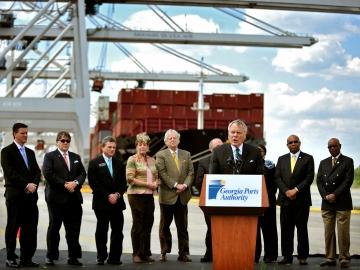
Section Branding
Header Content
Harbor Comment Period Ending
Primary Content

Tuesday is the deadline for public comments in a plan to deepen Savannah's harbor from 42 to 47 feet.
Supporters and opponents of the project have been picking over the massive proposal and have different conclusions for federal officials who'll make a final yes-or-no decision later this year.
The US Army Corps of Engineers spent 14 years studying plans to deepen the Savannah harbor.
Georgia officials have been pushing the idea for nearly two decades.
US Senator Johnny Isakson says, about 350,000 Georgia jobs depend on the ports being about to bring in larger vessels.
"It'll be a lot more than that with the deepening," Isakson says. "With the expansion, you'll be able to take the larger Panamax ships."
When the engineers released their final report on the project in April, its pages stacked up to 11 feet-tall.
The Corps' regional commander Col. Jeffrey Hall says, its key finding is a five-to-one cost-benefit ratio on the federal taxpayers cost of six-hundred-million-dollars.
"We studied deepening to 48 but concluded, the nation gains the greatest net benefit, $174 million annually, at the 47 foot depth," Col. Hall says.
That's a foot shallower than Georgia officials wanted.
But Georgia Ports Authority Executive Director Curtis Foltz says, he'll take it, since the difference won't harm his plans to bring more ships to Savannah.
"We are extremely excited about where this project is now," Foltz says. "The Army Corp of Engineers has done an outstanding job."
The jobs claim rallies business groups across the state.
Supporting the project is a guaranteed applause line for politicians.
But the report says little about jobs.
It says, deepening will lower the cost of shipping since more cargo can fit on larger ships.
But it says, the same amount of cargo will move through the port with or without the project.
Steve Willis of the Sierra Club says, that means far-off corporations will get the benefits while Savannah gets the environmental consequences.
"The Savannah harbor deepening project is extremely damaging," Willis says. "That's why they've had to put nearly half the project money to mitigate the damage they're going to do."
Corps officials now propose more than $300 million in projects aimed at offsetting harm to protected wetlands and species.
Deepening the Savannah River is expected to lower the, river's level of life-giving oxygen.
Savannah Riverkeeper Tonia Bonitatibus doubts a $32 million fish ladder will help endangered sturgeon survive.
"Once they get around that fish ladder, even if they were able to, the water coming out of the dam is so cold that it's probably not going to be conducive for them to spawn anyway," Bonitatibus.
The Corps also plans to spend $70 million injecting oxygen directly into the river.
Opponents call that a temporary fix and liken it to a life-support system.
Once four Obama cabinet appointees consider the comments and say yes-or-no, only Congress or courts could stop the project, which still needs the bulk of its funding from Congress.
Environmental groups promise to block the project in court.
Tags: logistics, Savannah, Georgia Sierra Club, endangered species, cargo, Johnny Isakson, Savannah River, sierra club, U.S. Army Corps of Engineers, Barack Obama, US Senator Johnny Isakson, US Army Corps of Engineers, Georgia Ports Authority, Curtis Foltz, President Barack Obama, President Obama, Army Corps of Engineers, U.S. Senator Johnny Isakson, Savannah Harbor, Savannah Riverkeeper, GPB News, Senator Johnny Isakson, Obama administration, Tonia Bonitatibus, orlando montoya, endangered fish, Savannah Harbor deepening, wetlands, Jeffrey Hall, Steve Willis, Savannah Harbor Deepening project, The U.S. Army Corps of Engineers
